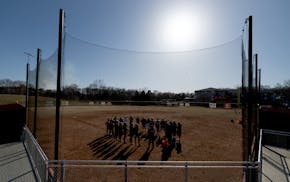ROCHESTER – Families who come to Channel One Regional Food Bank should be able to grab milk, some meat or protein, veggies and whatever else they need to get by.
That's no longer the case.
While Channel One does not turn away families in need, Minnesota's second-largest food shelf is finding itself with fewer options, thanks to drastic cuts in federal aid and U.S. Department of Agriculture (USDA) grants.
With federal officials mum on whether previous — or future — funding will come through, food banks and nonprofits are struggling to overcome financial obstacles they didn't see coming.
"We want people to find the food here that's meaningful to them, and right now we just don't have that variety and consistency," said Virginia Witherspoon, executive director of Channel One. "We just can't afford it."
Food shelves across the state face similar challenges after the Trump administration froze paying invoices and food-related grants through the USDA this year.
The cuts have forced smaller groups and co-ops to reduce staff and scale back operations. For larger groups like Channel One, it has meant limiting residents' access to kitchen staples, such as eggs, poultry and even milk.
Channel One faces about $77,000 in unpaid bills after the food bank recently learned it won't be reimbursed for grant money spent before the freeze.
Witherspoon said Channel One stopped buying poultry after realizing it owed one farmer about $10,000 — a payment that would have been made using federal funds. The food bank also recently stopped buying eggs after their cost, which also would have been paid through federal programs, significantly increased.
In the past, Channel One promised families that milk would always be available. Witherspoon said the food bank is trying to keep that promise, but the cost of milk has risen more than 35% in the past six months. If that trend continues, Channel One might reduce the amount of milk it buys in favor of something else.
"We're watching the prices; we're watching to see what happens," Witherspoon said.
The Village Agricultural Cooperative was started in 2019 to help micro-scale farmers in the Rochester area, mostly immigrants and refugees, find local markets and buyers for their produce. Last year, the co-op expanded its farmland to about 22 acres.
The co-op used a $100,000 USDA grant to buy and donate food from those farmers. But the federal pay freeze has crippled the organization. The Village isn't being reimbursed for its grant work, and another round of funding for this year is on hold.
That's about half of the co-op's budget, said Executive Director Amanda Nigon-Crowley. She said she had to lay off five part-time workers, leaving only two full-time staff, including herself.
Still, the small co-op is $30,000 in debt.
"I'm just having a really hard time wrapping my head around that we may not be reimbursed for work that was completed in 2024," Nigon-Crowley said.
Channel One and the Village co-op said they're exploring grants and private and corporate group funding to make up some of the lost. Food shelves across Minnesota are also turning to state lawmakers for help in hopes of surviving the federal funding pause.
"This is obviously devastating," Sophia Lenarz-Coy, executive director of the Food Group, told state senators last week at a committee hearing on food access and agricultural issues stemming from the pause.
Lenarz-Coy said the Food Group, which focuses on food access and agricultural training across Minnesota, wrapped up the first year of a four-year project to provide technical assistance to new farmers when the nonprofit learned in January that it won't be reimbursed for its work.
The $2.3 million project involved the Village and a few other Minnesota nonprofits. The project, along with a new pilot that will have new farmers work and learn together on small plots of land, appears in jeopardy as state and federal farm officials aren't answering questions about whether previously secured funding will still be available.
"Everyone is in a completely holding pattern," Lenarz-Coy said. "It's one thing to hear that this isn't how it should go; it's a really different thing to have to adjust to the financial reality we're seeing."
Farmers and local markets will likely suffer from the lack of funding, but food experts say it's too soon to tell how the freeze will affect access to food.
Witherspoon said families can still pick up food at Channel One, but food access needs are rising across the region.
About 1 in 5 Minnesotans rely on food shelves and other programs for their food, according to Second Harvest Heartland. About 35,000 households visit Channel One's food banks; about a quarter of those households are from outside Olmsted County.
In other words, people are so stressed to find food they're driving away from their local food banks to find more items at bigger organizations, including Channel One.
Witherspoon said she doesn't want to compound that stress by sharing how difficult it's becoming for nonprofits to find food. But, she said, something must be done to ensure people can continue to eat.
"We're trying to walk that fine line of telling the truth and telling the need, while not making our neighbors feel more insecure than they already are," Witherspoon said.

Golden Valley highway crash leaves one man dead; suspect in custody
Semi kills 10 cows on southeastern Minnesota highway
In South Carolina, Walz says Democrats 'need to change the attitude'
Two injured in shooting outside University of Minnesota arena after high school graduation

